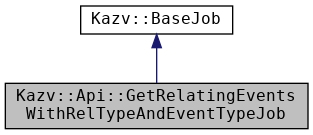|
| | GetRelatingEventsWithRelTypeAndEventTypeJob (std::string serverUrl, std::string _accessToken, std::string roomId, std::string eventId, std::string relType, std::string eventType, std::optional< std::string > from=std::nullopt, std::optional< std::string > to=std::nullopt, std::optional< int > limit=std::nullopt) |
| | Get the child events for a given parent event, with a given relType and eventType. More...
|
| |
| GetRelatingEventsWithRelTypeAndEventTypeJob | withData (JsonWrap j) && |
| |
| GetRelatingEventsWithRelTypeAndEventTypeJob | withData (JsonWrap j) const & |
| |
| | BaseJob (std::string serverUrl, std::string requestUrl, Method method, std::string jobId, std::string token={}, ReturnType returnType=ReturnType::Json, Body body=EmptyBody{}, Query query={}, Header header={}, std::optional< FileDesc > responseFile=std::nullopt) |
| |
| | ~BaseJob () |
| |
| bool | shouldReturnJson () const |
| |
| std::string | url () const |
| |
| Body | requestBody () const |
| |
| Header | requestHeader () const |
| |
| ReturnType | returnType () const |
| |
| Query | requestQuery () const |
| | returns the non-encoded query as an array of pairs More...
|
| |
| Method | requestMethod () const |
| |
| Response | genResponse (Response r) const |
| |
| BaseJob | withData (JsonWrap j) && |
| |
| BaseJob | withData (JsonWrap j) const & |
| |
| BaseJob | withQueue (std::string id, JobQueuePolicy policy=AlwaysContinue) && |
| |
| BaseJob | withQueue (std::string id, JobQueuePolicy policy=AlwaysContinue) const & |
| |
| json | dataJson (const std::string &key) const |
| |
| std::string | dataStr (const std::string &key) const |
| |
| std::string | jobId () const |
| |
| std::optional< std::string > | queueId () const |
| |
| JobQueuePolicy | queuePolicy () const |
| |
| std::optional< FileDesc > | responseFile () const |
| |
Get the child events for a given parent event, with a given relType and eventType.
Retrieve all of the child events for a given parent event which relate to the parent using the given relType and have the given eventType.
Note that when paginating the from token should be "after" the to token in terms of topological ordering, because it is only possible to paginate "backwards" through events, starting at from.
For example, passing a from token from page 2 of the results, and a to token from page 1, would return the empty set. The caller can use a from token from page 1 and a to token from page 2 to paginate over the same range, however.
| Kazv::Api::GetRelatingEventsWithRelTypeAndEventTypeJob::GetRelatingEventsWithRelTypeAndEventTypeJob |
( |
std::string |
serverUrl, |
|
|
std::string |
_accessToken, |
|
|
std::string |
roomId, |
|
|
std::string |
eventId, |
|
|
std::string |
relType, |
|
|
std::string |
eventType, |
|
|
std::optional< std::string > |
from = std::nullopt, |
|
|
std::optional< std::string > |
to = std::nullopt, |
|
|
std::optional< int > |
limit = std::nullopt |
|
) |
| |
|
explicit |
Get the child events for a given parent event, with a given relType and eventType.
- Parameters
-
| roomId | The ID of the room containing the parent event. |
| eventId | The ID of the parent event whose child events are to be returned. |
| relType | The relationship type to search for. |
| eventType | The event type of child events to search for. |
Note that in encrypted rooms this will typically always be m.room.encrypted regardless of the event type contained within the encrypted payload.
- Parameters
-
| from | The pagination token to start returning results from. If not supplied, results start at the most recent topological event known to the server. |
Can be a next_batch token from a previous call, or a returned start token from /messages, or a next_batch token from /sync.
- Parameters
-
| to | The pagination token to stop returning results at. If not supplied, results continue up to limit or until there are no more events. |
Like from, this can be a previous token from a prior call to this endpoint or from /messages or /sync.
- Parameters
-
| limit | The maximum number of results to return in a single chunk. The server can and should apply a maximum value to this parameter to avoid large responses. |
Similarly, the server should apply a default value when not supplied.


 Public Member Functions inherited from Kazv::BaseJob
Public Member Functions inherited from Kazv::BaseJob Static Public Member Functions inherited from Kazv::BaseJob
Static Public Member Functions inherited from Kazv::BaseJob Public Types inherited from Kazv::BaseJob
Public Types inherited from Kazv::BaseJob Static Public Attributes inherited from Kazv::BaseJob
Static Public Attributes inherited from Kazv::BaseJob Protected Member Functions inherited from Kazv::BaseJob
Protected Member Functions inherited from Kazv::BaseJob